| | | | | | | Presented By Economist Impact | | | | Axios World | | By Dave Lawler ·Feb 28, 2022 | | Welcome back to Axios World. - Like many of you, I've been utterly transfixed by the events in Ukraine over the past week.
- This edition (2,049 words, 7½ minutes) starts with a piece by my colleague Zach Basu on the extraordinary EU response, gets you up to speed on the fighting, and brings you to Kyiv for a view from the street.
- Personal note: I know many of you value variety in this newsletter, and I have every intention of giving you some soon. And if anyone is reading this from Ukraine, the world is with you. 🇺🇦
Subscribe | | | | | | 1 big thing: Putin turns the EU into a foreign policy power | 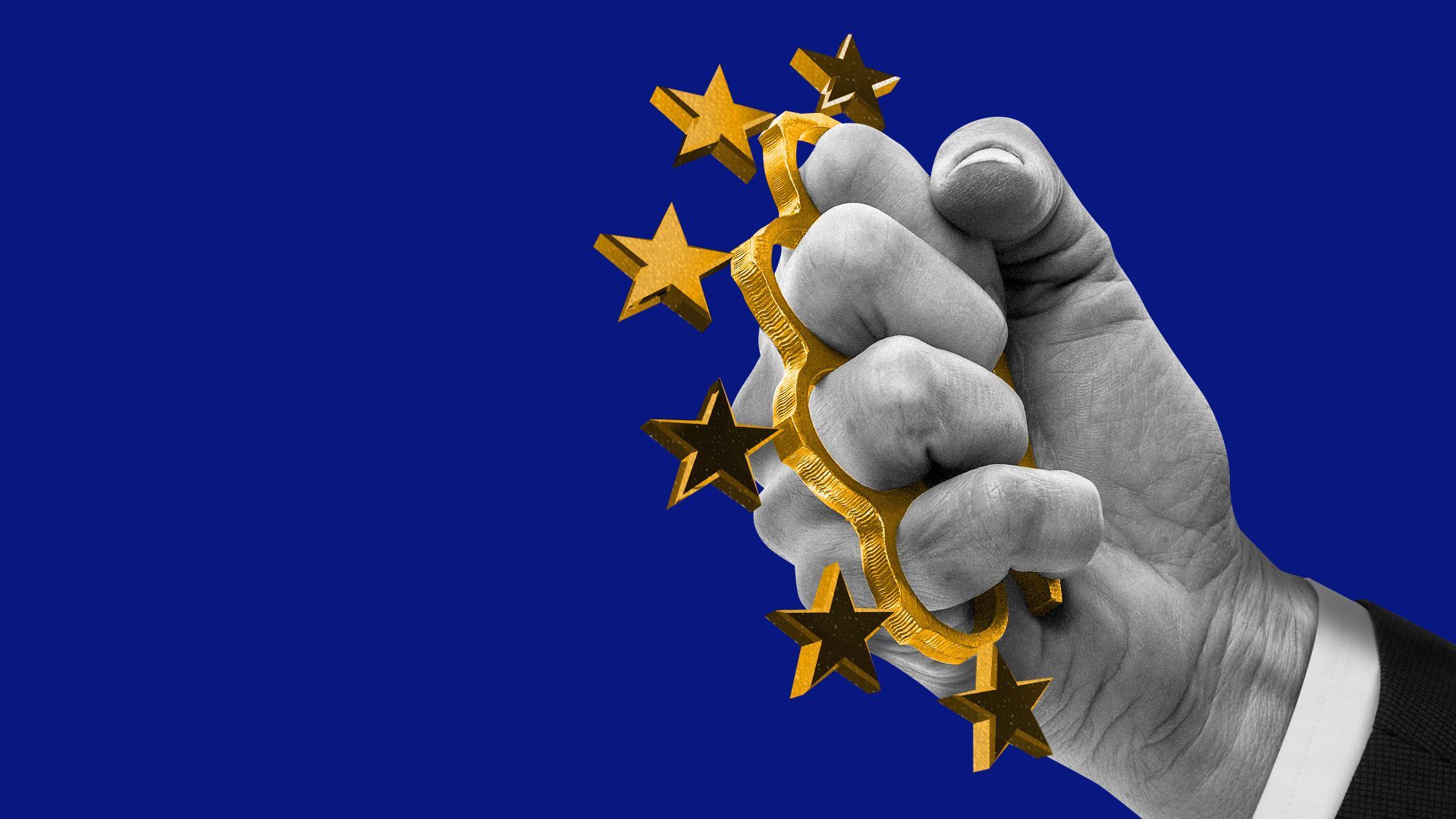 | | | Illustration: Aïda Amer/Axios | | | | The European Union has moved with unprecedented speed and strength to sanction Russia and aid Ukraine, shattering its plodding, bureaucratic image with a response that would have seemed inconceivable one week ago, Zach writes. Why it matters: Putin has done the unthinkable with his unprovoked assault, reversing decades of German defense and energy policy, turning a European peace project into a weapons dealer, and setting Ukraine on an accelerated path to EU membership. How we got here: On Thursday night, less than 24 hours after the first missiles began raining down on Ukraine, President Volodymyr Zelensky told EU leaders on a video call that "this might be the last time you see me alive." - His emotional appeal helped kick diplomacy into overdrive and rally all 27 member states — including historically cautious Germany and Kremlin-friendly Hungary — around the harshest EU sanctions regime ever assembled.
- The European Commission then announced a total ban on Russian-owned planes in its airspace, restricted access to Russian state media, and made an unprecedented pledge to collectively arm Ukraine.
What they're saying: "The taboo that the EU cannot use its own resources to provide arms to a country that has been aggressed by others has fallen," EU foreign policy chief Josep Borrell declared Sunday as he announced a $500 million military aid package. - "This is a defining moment for European history," he said.
- European Commission President Ursula von der Leyen echoed Zelensky's message that Ukrainians were fighting for "the whole of Europe" on Sunday, calling Ukraine "one of us." On Monday, Zelensky signed an application to become a member of the EU.
The big picture: Putin and Zelensky's polar opposite behavior has catalyzed the EU's transformation into a foreign policy heavyweight. - "We're all sharing on social media those wonderful moments of Ukrainians being incredibly brave," a European diplomat told Axios. "Everyone — everyone — in the West is looking at Zelensky and they're looking at what the Ukrainians are doing and are incredibly impressed."
- "There's absolute clarity this is an unprovoked war of aggression. And if Putin is not stopped in Ukraine, where does he stop?" the diplomat added.
- "If you're in Central Europe or the Baltics, Ukraine is not a far-off place. And the historical resonance of watching these troops roll through borders is extremely powerful."
Zoom in: The shock to Europe's security order has trickled down to nearly every EU member state, large and small. - The impact has been most profound in Germany, where the government announced it would set up a €100 billion ($112 billion) fund to upgrade its military, spend 2% of GDP on defense and urgently seek to reduce German dependence on Russian gas.
- In Finland, lawmakers will meet Tuesday to discuss possible NATO membership, one day after a poll found that a majority of Finns support joining the alliance for the first time ever.
The bottom line: "One of the reasons we can assume that Putin is surprised by the strength of response is that we're all surprised by it," one Western diplomat joked. |     | | | | | | 2. State of the war, Part I: A new, uglier phase |  | | | A satellite image of a large Russian military convoy north of Kyiv on Monday, which stretches for about 40 miles, from near Antonov Airport in the south to the northern end of the convoy near Prybirsk, according to analysts. Photo: Maxar Images | | | | The advance of a miles-long armored convoy to within 16 miles of Kyiv today, as well as heavy shelling of Ukraine's second city Kharkiv, may herald a new phase of the fighting after five days of stiff Ukrainian resistance. State of play: Michael Kofman, a leading expert on Russia's military at CNA, says Moscow's plans of sprinting to Kyiv and forcing a swift surrender — ideally with limited Western sanctions or domestic blowback — have largely failed. He's now expecting more artillery and air power: "This war could get a lot more ugly." It already is. - Ukrainian officials said dozens of civilians were killed when Russian forces bombarded residential areas of Kharkiv, a mostly Russian-speaking city near the border. The casualty numbers could not be verified.
- The attacks took place just as Russian and Ukrainian delegations were meeting near the Belarus-Ukraine border for peace talks.
- The Ukrainian side emerged from the talks with little optimism, and Russian President Vladimir Putin has shown no flexibility thus far. He told French President Emmanuel Macron that Ukraine must disarm, proclaim its neutrality, and recognize Crimea as Russian, according to state media.
Meanwhile, the massive convoy — comprised of hundreds of armored vehicles, tanks, towed artillery and logistics support vehicles — continued to advance on Kyiv from the north. - A senior Pentagon official said Russia's goal is to "encircle Kyiv from multiple locations" and to capture Kharkiv and the port city of Mariupol to isolate eastern Ukraine.
- Air raid sirens have been sounding in the capital once again tonight.
Russian forces have thus far claimed the most territory in the south. - In Berdyansk, a town near Mariupol that is now under Russian control, residents shouted at the occupying troops to go home and sang the Ukrainian national anthem in the main square.
- Elsewhere, civilians have attempted to block the advance of tanks with their bodies.
- Morale appears low among the Russian forces, who didn't know until the last minute that they'd be ordered to invade a country they don't see as an adversary, Kofman says.
|     | | | | | | 3. State of the war, Part II: Ukraine seizes the narrative |  | | | Ukrainian service members look for unexploded shells after fighting with a Russian raiding group in Kyiv on Saturday. Photo: Sergei Supinsky/AFP via Getty | | | | Ukrainian officials have attempted to seize on that low morale. - Defense Minister Oleksii Reznikov said any Russian soldier who voluntarily surrendered to Ukrainian captivity would receive 5 million rubles ($47,000).
- Meanwhile in today's emergency UN session, Ambassador Sergiy Kyslytsya read what he said were the last text messages sent from a confused and frightened Russian soldier to his mother minutes before he was killed.
- Zelensky accused Russian troops of slaughtering civilians in Kharkiv and requested a no-fly zone from NATO and the U.S. Both have ruled that out because it would bring them into a direct military conflict with Russia.
But NATO countries are continuing to promise and provide hundreds of millions of dollars' worth of weaponry. - Russia warned today that it would hold the countries that provide such weaponry responsible if they are used to attack Russian troops.
- As with Putin's announcement on Sunday that he would put Russia's nuclear deterrent on alert, it was a vague but ominous indication that this war could intensify in once-unimaginable ways.
State of play: A senior U.S. defense official told reporters today that Russia has deployed nearly 75% of its assembled combat power inside Ukraine but has failed to achieve air superiority and is struggling with logistical issues, like military vehicles running out of fuel. What to watch: Russia still has a good deal of capabilities "on the sidelines," including most of its air force, Kofman says. He's expecting a new scale of warfare in the days to come. |     | | | | | | A message from Economist Impact | | How insight, innovation and influence lead to impact | | | 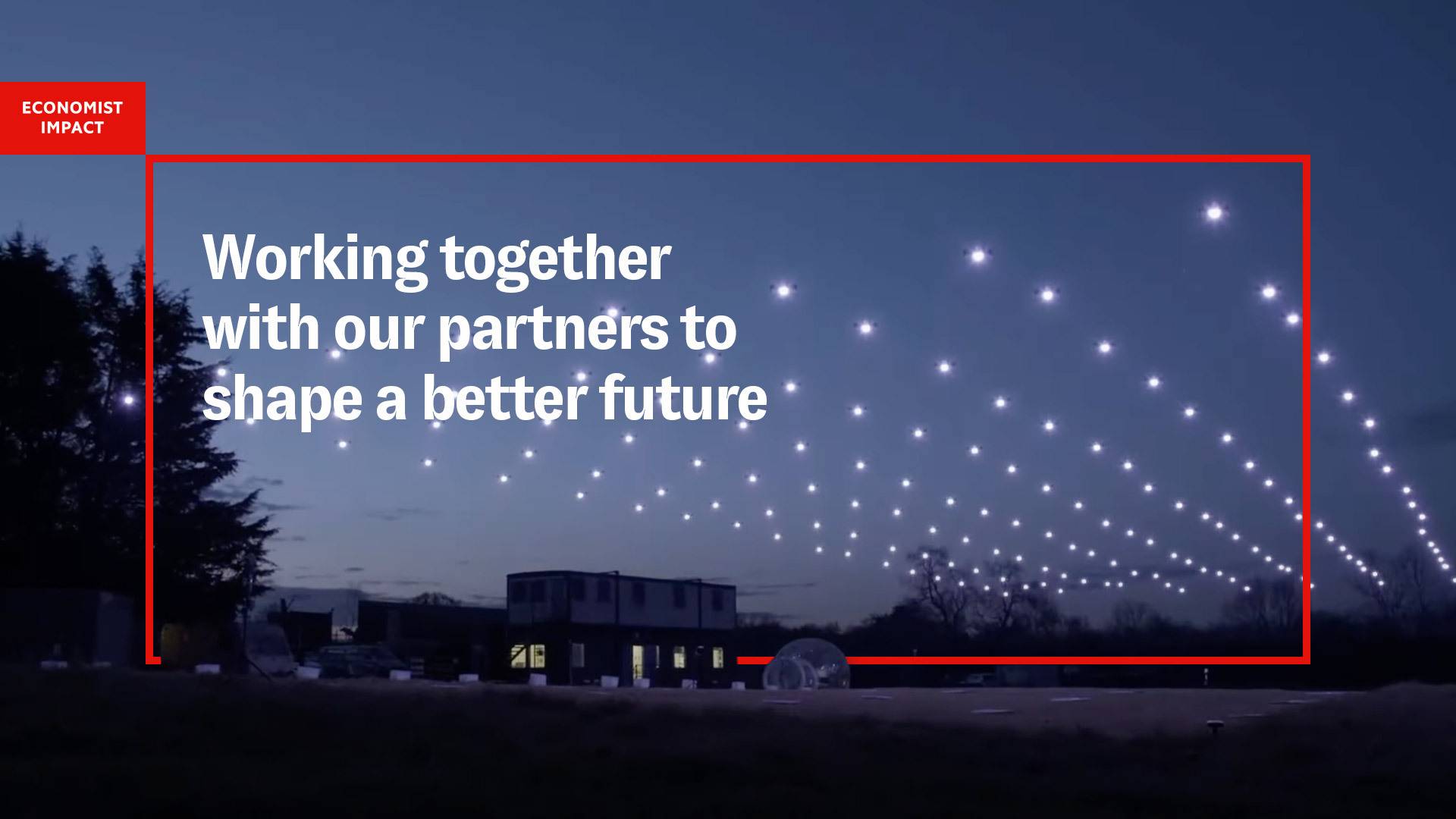 | | | | Economist Impact combines policy research, global events, innovative design and creative story-telling to turn ideas into action. The goal: Catalyse growth and change in the world. For expert commentary, innovation and thought leadership, follow Economist Impact on LinkedIn. | | | | | | Bonus: The war in three charts |  Data: UNHCR; Map: Danielle Alberti/Axios More than half a million Ukrainian refugees have arrived in neighboring countries since Russia launched its unprovoked invasion of Ukraine, the UN refugee agency said today, warning that the number is expected to steadily rise.  Data: UN; Map: Axios Visuals Eighty-seven countries either voted for or co-sponsored a draft UN Security Council resolution deploring Russia's invasion of Ukraine on Friday, though Russia used its veto to block it. More are expected to join the condemnation at the emergency General Assembly session this week.  Data: FactSet; Chart: Will Chase/Axios The ruble is quickly shedding value as a result of harsher-than-expected sanctions. (P.S... I didn't have time to come up with a puzzle today, but Where in the World will return in its original format very soon.) |     | | | | | | 4. View from Kyiv: "They want to make our life impossible" | 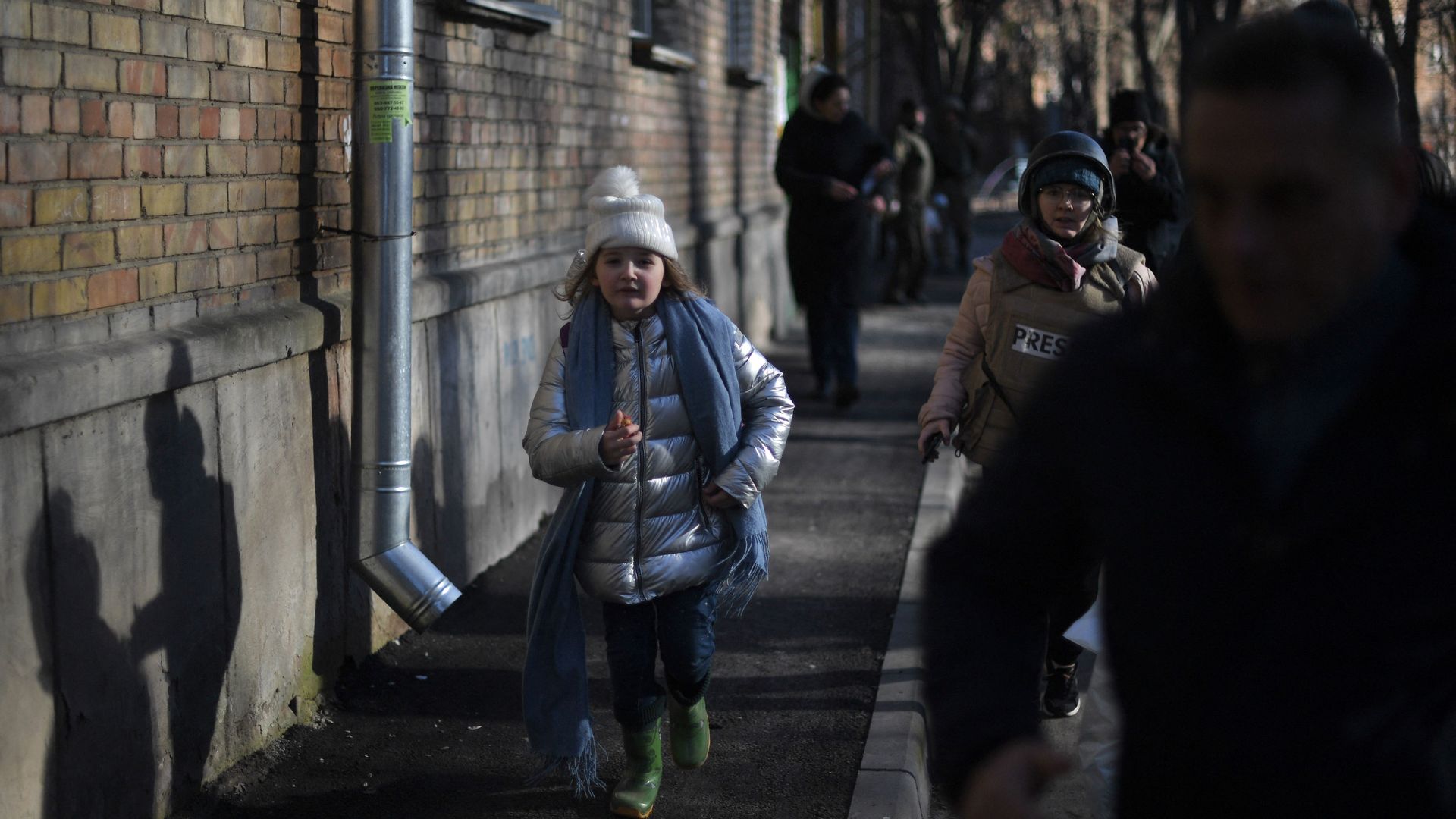 | | | Running to the bomb shelter in Kyiv. Photo: Daniel Leal/AFP via Getty | | | | I spoke today with Kristina Zeleniuk, a Ukrainian journalist and one of many Kyiv residents now preparing for the possibility of life under siege. On the ground: "I packed all my things. They are in my car. My car is full of fuel. If I understand that Kyiv is falling down, of course it will be more safe for me to leave Kyiv. … But I have prepared for the worst as have all of my friends and other people who are staying." Kristina has been working from an underground garage at her parents' home and running to a nearby bomb shelter when air raid sirens sound. - Many friends have fled the city, others are now patrolling it for the Territorial Defense Forces. She worries the Russians will complete their blockade of Kyiv and "make our life impossible."
- It's already difficult to obtain cash or prescription drugs. Grocery stores have long lines and lack many staples, like bread. "People are panicking because they don't have much money for tomorrow," she says.
- "Every night and every morning we wake up with bomb sounds, explosions. We see all the aviation flying about our homes. It's the worst thing that I've ever seen. It's hard. But we are trying to be positive."
Still, Kristina expresses immense pride in her country. - "Nobody expected, even the Ukrainians, that we had such a strong army," she says.
- She says Ukrainians were sharply politically polarized before the war but have now rallied around their president and reveled in the reports that he rejected evacuation offers from the U.S.
- "In the first days of this war, we thought he wouldn't resist and stand up to Putin. We thought, 'Ok, it's the Russian army [that he's up against].' Now we see that Zelensky isn't going anywhere."
But Kristina is well-aware that more Russian troops are moving toward Kyiv. - She sees no hope for peace talks because Russian leaders "don't see Ukraine as a sovereign state. They want to destroy us, that's all."
When I remark that Ukraine is "fighting alone," she cuts me off with a sharp "no, no, no." - "We have many requests from foreigners who are coming right now to Ukraine to fight on our side. It's amazing. French people, Poles, Lithuanians, Czechs."
- "Maybe it will be in future historians' books," she says, remarking that never in Ukraine's history has it had so much international support.
|     | | | | | | 5. The world vs. Putin | 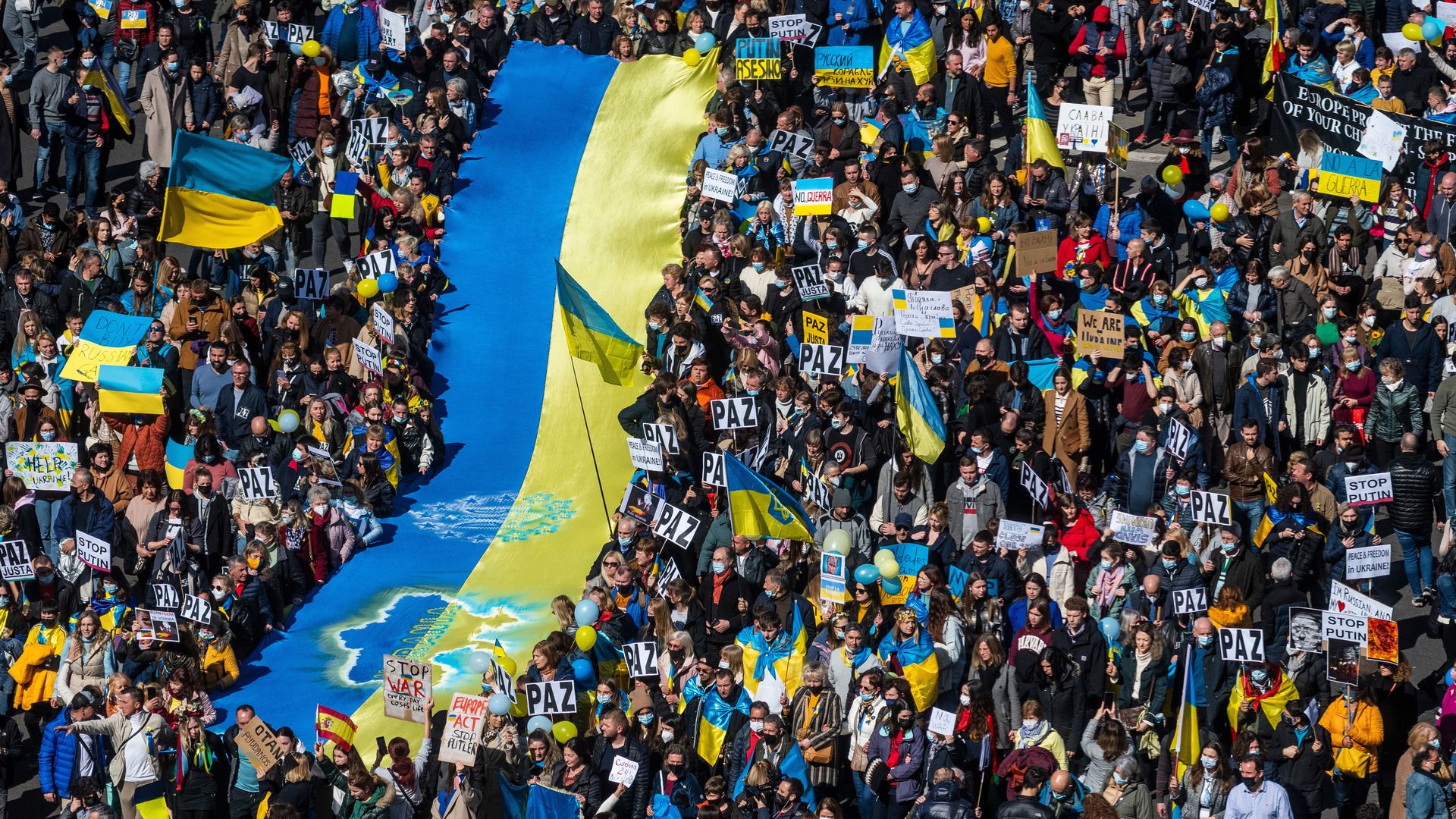 | | | Demonstrations in Madrid on Sunday. Photo: arcos del Mazo/LightRocket via Getty | | | | One of the most powerful countries on Earth is quickly becoming one of the most isolated. Two of the last entities one might expect to make moral stands — Big Oil and FIFA, the corruption-tainted international soccer federation — have taken dramatic action in the last 24 hours to shed Russian investment and ban Russian teams. - Sweden and Finland are breaking with decades of neutrality to supply arms to Ukraine and openly debate NATO membership.
- Even Switzerland, a neutral country and a haven for shady cash, says it will join the EU sanctions, while Monaco — a favorite hideaway for oligarchs and their wealth — says it will start freezing funds.
- Sanctions on SWIFT went from off the table to on the books under pressure from Zelensky.
One big taboo remains. - The sanctions architects in Washington and European capitals are trying to steer clear of oil and gas, fearing major price spikes. But there is now a serious debate underway in Europe about reliance on Russian energy.
What to watch: Unexpectedly strong sanctions from the U.S., EU, U.K. and several other countries have sent the ruble plunging and will have far-reaching repercussions for the economy and the Russian people, who did not vote for this war. - Western politicians hope that will translate into pressure on the Kremlin. But an increasingly isolated Putin — watching his economy tank and his troops struggle — is a dangerous prospect for Russia, Ukraine and the world.
|     | | | | | | 6. One place left to turn | 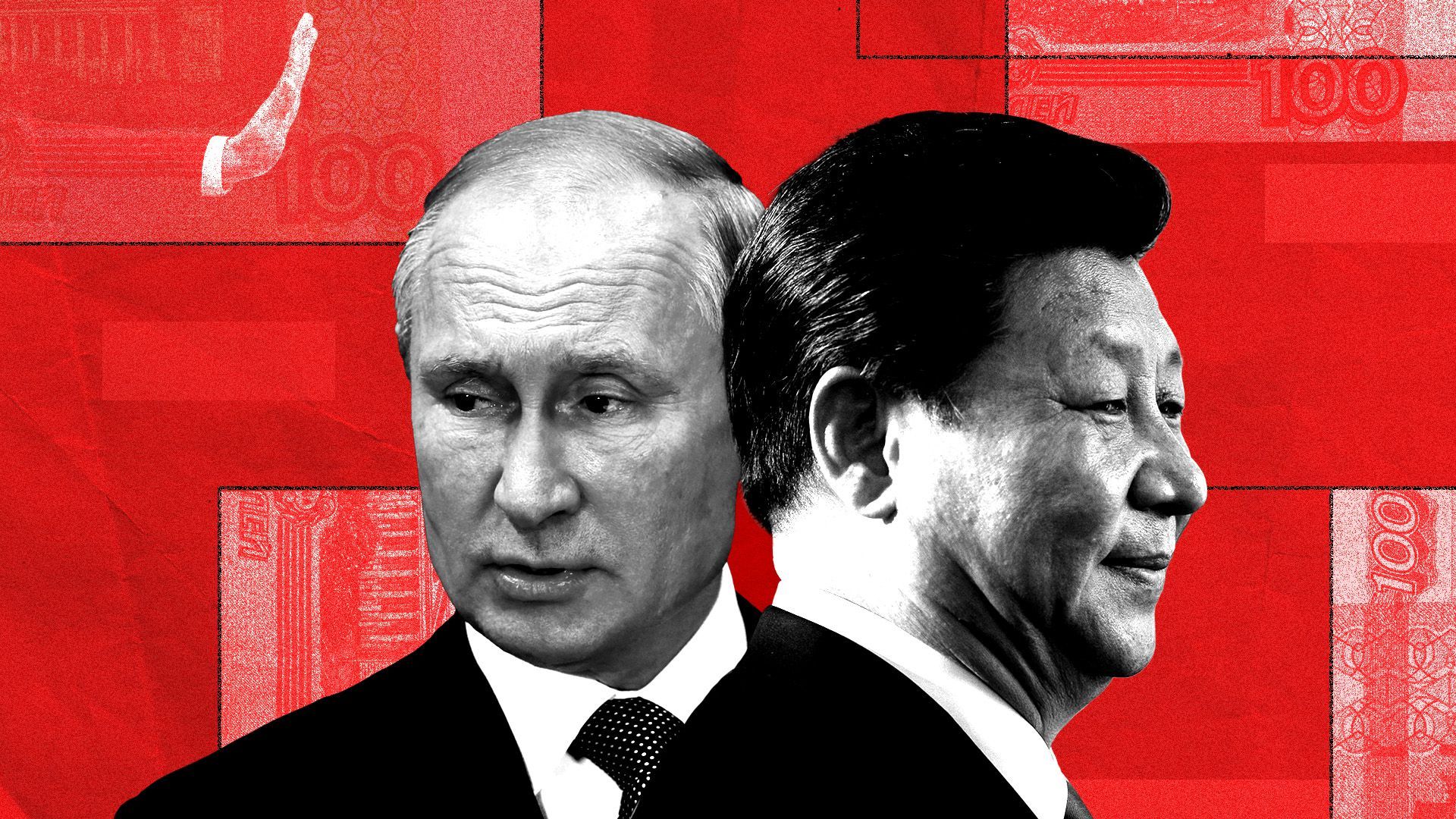 | | | Photo illustration: Sarah Grillo/Axios. Photos: Mikhail Svetlov, Leon Neal WPA Pool/Getty Images | | | | The sanctions will increase Russia's already significant economic reliance on China, Axios' Bethany Allen-Ebrahimian and I write. Why it matters: Moscow could blunt the impact of sanctions by deepening its growing alignment with Beijing, giving both countries more leverage in their disputes with the West — but potentially fostering resentment in Russia over the increasingly lopsided relationship. China has remained on the fence over Russia's invasion, but several decisions taken in the past few weeks underscore Beijing's status as a potential sanctions shock absorber. - But China's leaders aren't willing to indelibly tie themselves to "Putin's chariot," says Yun Sun said of the Stimson Center.
- Meanwhile, Moscow already chafes at being beholden to a country that was once its protégé, and it's uncomfortable with China's growing presence in Central Asia.
Go deeper |     | | | | | | 7. Stories we're watching | 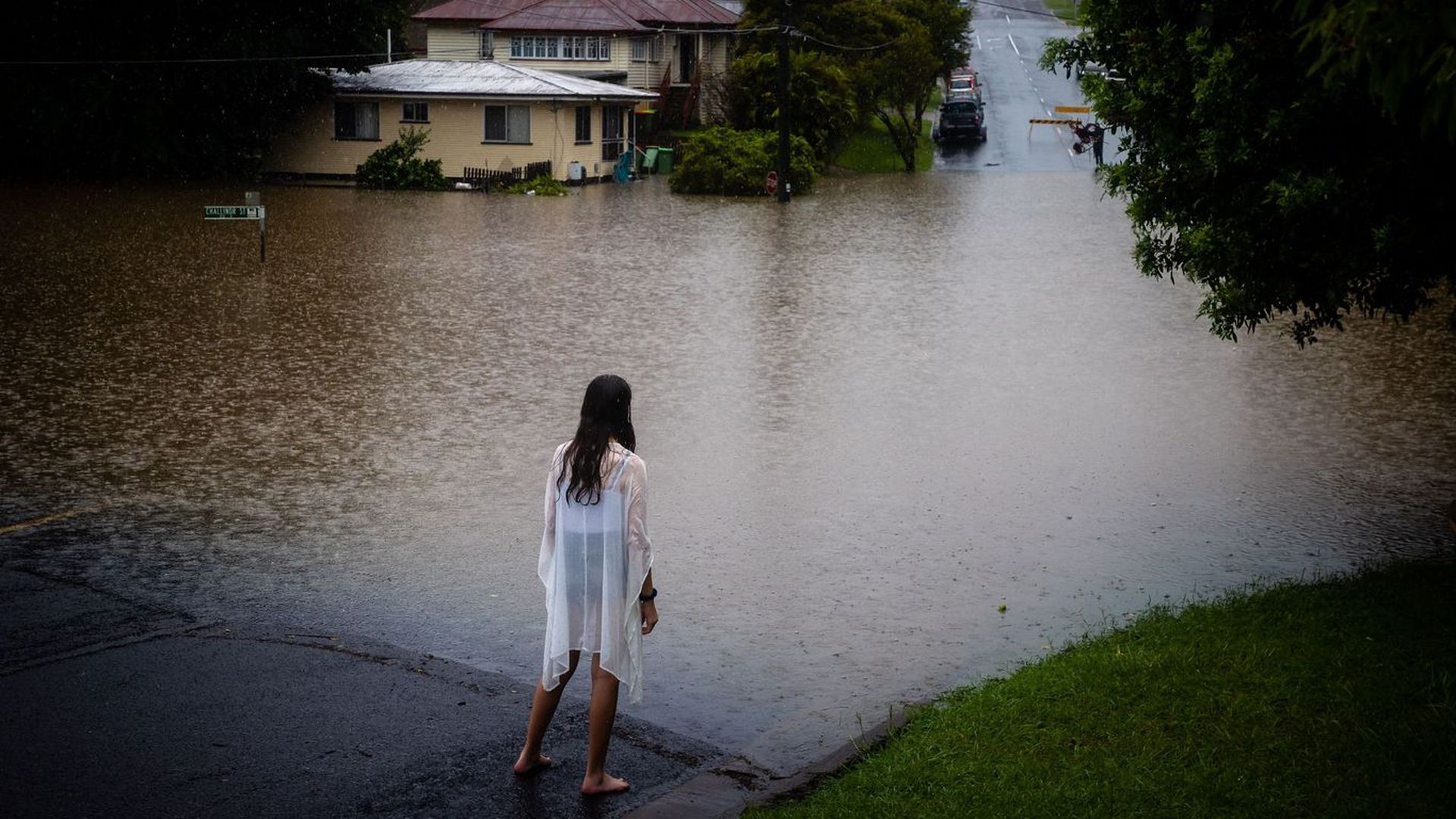 | | | Floodwaters rise in Australia on Saturday. Photo: Patrick Hamilton/AFP via Getty Images | | | - We're running out of time to adapt to climate change, UN report finds
- Toyota halts production in Japan after suspected cyberattack
- El Salvador charges ex-president in massacre of Jesuit priests
- UN Security Council imposes arms embargo on Yemen's Houthi rebels
- Hong Kong weighs lockdown as daily infections surge
- Mexico investigating reports that 17 people were killed at a wake
- Ukrainian expats and foreign nationals join the fight in Ukraine
Quoted: "Doomed to failure." — Hungarian Prime Minister Viktor Orbán's description of potential Russia sanctions in the event of a Ukraine invasion in a friendly visit with Putin on Feb 1. "Whatever sanctions EU member states agree on, we'll back them." |     | | | | | | A message from Economist Impact | | How insight, innovation and influence lead to impact | | |  | | | | Economist Impact combines policy research, global events, innovative design and creative story-telling to turn ideas into action. The goal: Catalyse growth and change in the world. For expert commentary, innovation and thought leadership, follow Economist Impact on LinkedIn. | | |  | Bring the strength of Smart Brevity® to your team — more effective communications, powered by Axios HQ. | | | | | | Axios thanks our partners for supporting our newsletters. If you're interested in advertising, learn more here.
Sponsorship has no influence on editorial content. Axios, 3100 Clarendon Blvd, Suite 1300, Arlington VA 22201 | | | You received this email because you signed up for newsletters from Axios.
Change your preferences or unsubscribe here. | | | Was this email forwarded to you?
Sign up now to get Axios in your inbox. | | | | Follow Axios on social media:    | | | | | |
Post a Comment
0Comments